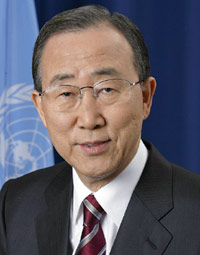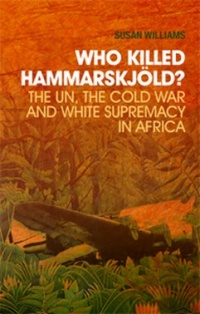Ban Ki-moon
 | ||||||||||||||||
| Born | 13 June 1944 Onnan Township, Injō County, Chūseihoku Province, Japanese Korea | |||||||||||||||
| Nationality | South Korean | |||||||||||||||
| Alma mater | • Seoul National University • Harvard/Kennedy School | |||||||||||||||
| Children | 3 | |||||||||||||||
| Spouse | Yoo Soon-taek | |||||||||||||||
| Member of | Belfer Center for Science and International Affairs | |||||||||||||||
8th UN Secretary General
| ||||||||||||||||
Ban Ki-moon is a former Secretary-General of the United Nations, after succeeding Kofi Annan in 2007. Before becoming Secretary-General, Ban was Foreign Minister of the Republic of Korea from January 2004 to November 2006, having previously been a career diplomat in South Korea's Ministry of Foreign Affairs.
Ban was said to have struggled in his first month to adjust to the culture of the UN, but quickly found his bearings and passed several major reforms on peacekeeping and UN employment practices. Diplomatically, Ban has taken particularly strong views on global warming, pressing the issue repeatedly with US President George W. Bush, and on the Darfur conflict, where he helped persuade Sudanese president Omar al-Bashir to allow peacekeeping troops to enter Sudan.[1]
On 21 June 2011, Ban was unanimously re-elected by the General Assembly to serve until 31 December 2016,[2] when he will be succeeded by Portugal's António Guterres.[3]
In August 2016, declaring "this may be our last chance to find the truth", Ban Ki-moon called for the appointment of “eminent person or persons” to pursue an investigation into the death of his predecessor, Dag Hammarskjöld in a mysterious 1961 air crash at Ndola in Northern Rhodesia (now Zambia):
- “Seeking a complete understanding of the circumstances is our solemn duty to my illustrious and distinguished predecessor, Dag Hammarskjöld, to the other members of the party accompanying him, and to their families.”[4]
Contents
Hammarskjöld Commission
The Hammarskjöld Commission was established in July 2012 as a voluntary body of four international jurists who were invited by an international Enabling Committee to report whether, in their view, the evidence now available would justify the United Nations in reopening its inquiry into the cause of death of UN Secretary-General Dag Hammarskjöld, pursuant to General Assembly resolution 1759 (XVII) of 26 October 1962.[5] The 2011 book by author Susan Williams entitled "Who Killed Hammarskjöld?" had argued that the plane was brought down, and prompted the diplomat's nephew Knut Hammarskjöld to call for a new inquiry.
The Hammarskjöld Commission's report, which was published on 9 September 2013, recommended that the United Nations should launch a new investigation into the crash, stating that the possibility that the plane was attacked from above, or that it was forced down due to threats, should be "taken seriously, despite everything". On 11 February 2014, the UN Regional Information Centre for Western Europe (UNRIC) reported that UN Secretary-General Ban Ki-moon had written to the President of the UN General Assembly (UNGA) requesting that the Hammarskjöld Commission's report should be included in the agenda of UNGA's current session since "new evidence has come to his attention."
A member of the Hammarskjöld Inquiry Trust, Karl Gustav Hammar, the former head of the Church of Sweden, welcomed the Secretary-General's initiative:
- "My interpretation is that the Secretary-General wants the Member States to take an internal look and present whatever they may find in their archives," Archbishop Hammar says. "Since the Hammarskjöld Commission pointed to the US National Security Agency (NSA), I think Ban Ki-moon wants to decrease the pressure and ask: who knows anything at all? Now that the UN General Assembly will put the issue on its agenda, there will be a chance for a discussion," Hammar told Swedish newspaper Dagens Nyheter.[6]
E-petition
On 29 April 2014, an e-petition was created and recommended that UN Secretary-General Ban Ki-moon should propose extending the remit of the new UN Inquiry to cover the deaths of both Dag Hammarskjöld and Bernt Carlsson:
- "Take action to investigate the deaths of UN Officials Dag Hammarskjöld and Bernt Carlsson!"[7]
On 19 May 2014, the Wall Street Journal confirmed that, because of the weight of evidence uncovered by Dr Susan Williams, UNGA had put the Hammarskjöld case on its agenda for discussion during its current session at a date to be arranged. As a result, a draft resolution to reopen the adjourned 1962 UN Inquiry could then be put to a vote by the General Assembly.[8]
Appointments by Ban Ki-moon
| Appointee | Job | Appointed | End |
|---|---|---|---|
| Filippo Grandi | UN/High Commissioner/Refugees | 1 January 2016 | |
| Margot Wallström | United Nations Special Representative on Sexual Violence in Conflict | April 2010 | 22 June 2012 |
Events Participated in
| Event | Start | End | Location(s) | Description |
|---|---|---|---|---|
| Munich Security Conference/2011 | 4 February 2011 | 6 February 2011 | Germany Munich Bavaria | The 47th Munich Security Conference |
| Munich Security Conference/2014 | 31 January 2014 | 2 February 2014 | Germany Munich Bavaria | The 50th Munich Security Conference |
| Munich Security Conference/2020 | 14 February 2020 | 16 February 2020 | Germany Munich Bavaria | The 56th Munich Security Conference, in 2020, "welcomed an unprecedented number of high-ranking international decision-makers." |
| Munich Security Conference/2024 | 16 February 2024 | 18 February 2024 | Germany Munich Bavaria | Annual conference of mid-level functionaries from the military-industrial complex - politicians, propagandists and lobbyists - in their own bubble, far from the concerns of their subjects |
| WEF/Annual Meeting/2006 | 25 January 2006 | 29 January 2006 | Switzerland WEF | Both former US president Bill Clinton and Bill Gates pushed for public-private partnerships. Only a few of the over 2000 participants are known. |
| WEF/Annual Meeting/2008 | 23 January 2008 | 27 January 2008 | Switzerland WEF | At the 2008 summit, Klaus Schwab called for a coordinated approach, where different 'stakeholders' collaborate across geographical, industrial, political and cultural boundaries." |
| WEF/Annual Meeting/2009 | 23 January 2009 | 27 January 2009 | Switzerland WEF | Chairman Klaus Schwab outlined five objectives driving the Forum’s efforts to shape the global agenda, including letting the banks that caused the 2008 economic crisis keep writing the rules, the climate change agenda, over-national government structures, taking control over businesses with the stakeholder agenda, and a "new charter for the global economic order". |
| WEF/Annual Meeting/2013 | 23 January 2013 | 27 January 2013 | Switzerland WEF | 2500 mostly unelected leaders met to discuss "leading through adversity" |
| WEF/Annual Meeting/2014 | 22 January 2014 | 25 January 2014 | Switzerland WEF | 2603 guests in Davos considered "Reshaping The World" |
| WEF/Annual Meeting/2016 | 20 January 2016 | 23 January 2016 | Switzerland WEF | Attended by over 2500 people, both leaders and followers, who were explained how the Fourth Industrial Revolution would changed everything, including being a "revolution of values". |
Related Document
| Title | Type | Publication date | Author(s) | Description |
|---|---|---|---|---|
| Document:Open letter to Ban Ki-Moon from Richard Falk | open letter | 7 February 2016 | Richard Falk | On-the-button open letter from Richard Falk to Ban Ki-moon about Israeli attacks on the latter for his modest, reasonable and accurate criticism of Israeli policy - Schadenfreude would be understandable in light of Richard Falks experience at Moon's hands. |
References
- ↑ "Ban Ki-moon ends hands-on involvement in climate change talks"
- ↑ "UN biography of Ban Ki-moon"
- ↑ "António Guterres appointed next UN Secretary-General by acclamation"
- ↑ "Dag Hammarskjöld: Ban Ki-moon seeks to appoint investigator for fatal crash"
- ↑ "Hammarskjöld Commission Mandate"
- ↑ "Report on Hammarskjöld's death to be presented to General Assembly"
- ↑ "Take action to investigate the deaths of UN Officials Dag Hammarskjöld and Bernt Carlsson!"
- ↑ "U.N. Considers Reopening Probe into 1961 Crash that Killed Dag Hammarskjöld"
Wikipedia is not affiliated with Wikispooks. Original page source here
